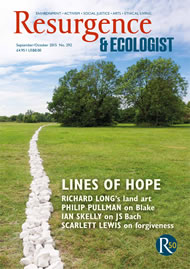Five years after the crash of 2008/9, with banks fined billions of dollars for malpractice and market manipulation on both sides of the Atlantic, this thought-provoking book examines the fundamentals of the capitalist system in the light of Buddhist thinking.
The Buddha on Wall Street begins with Adam Smith, takes in E.F. Schumacher’s 1966 essay on Buddhist economics and ends with the question “Which is it to be: a life of Enlightenment or a life of shopping?”
Motivation and right livelihood are fundamental elements in Buddhist thought. Why do we do the things we do? In creating unnecessary desires, capitalism thrives on the promotion of false wants and mental suffering. But it is arguably only through the wealth generated by capitalism that people can have decent shelter, clean water and enough to eat.
Although Vaddhaka Linn acknowledges the creative side of business, he oversimplifies the portrayal of greed and selfishness (capitalism) versus generosity and altruism (Buddhism). In particular, there is no mention of philanthropy, which is, after all, compassion in action – the application of the fruits of capitalism for the benefit of others. Think of the Gates Foundation, one of many.
I would have liked Linn to explore this middle ground between capitalism driving material desires, and Buddhism purifying the human character.
There are ‘Wolves’ and ‘Buddhas’ on Wall Street, but there are also many people in between. Money itself is not the problem – it’s what we do with it that counts. After all, no one would have heard of the Good Samaritan if he hadn’t had a fiver in his pocket.
That said, there are fascinating insights into the means through which multinational corporations have amassed wealth and power whilst avoiding paying taxes wherever possible. A crucial turning point was the 1916 shareholder suit against the Ford Motor Company when it was determined that Henry Ford had no right to give corporate money away – the corporation has a legal duty to look after the interests of the shareholders, not to act for the common good.
Governments can impose taxation and regulation to curb excesses, as the developed world has broadly done through welfare economics since 1945. But the greatest challenges – environmental and technological – lie ahead.
We know that 7 billion people cannot keep consuming ever greater quantities of ‘stuff’. Infinite growth on a finite planet is impossible, but we need a moral underpinning and a deep commitment to community to be able to change course.
The Buddha on Wall Street examines Bhutan’s Gross National Happiness Index and the Five Ways to Wellbeing promoted by the New Economics Foundation, before suggesting practical steps Buddhists – and non-Buddhists – can take to change the world around them.
Linn is clear that ‘reducing input’ is vital for the avoidance of suffering, but how we reduce mind-disturbing distractions in an age of ever greater electronic connectivity is perhaps the greatest challenge of all. He warns of the assault of commerce on the final frontier – our minds – and compares data mining by Google with the enclosures of the 17th and 18th centuries.
Faced with the onslaught of contemporary consumerism and social media, we run the risk of becoming ‘pancake people’ – spread wide and thin, but lacking depth.
For anyone interested in avoiding that fate, this book is well worth reading.







